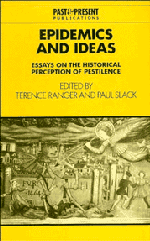Book contents
- Frontmatter
- Contents
- Contributors
- Preface
- 1 Introduction
- 2 Epidemic, ideas and classical Athenian society
- 3 Disease, dragons and saints: the management of epidemics in the Dark Ages
- 4 Epidemic disease in formal and popular thought in early Islamic Society
- 5 Plague and perceptions of the poor in early modern Italy
- 6 Dearth, dirt and fever epidemics: rewriting the history of British ‘public health’, 1780–1850
- 7 Epidemics and revolutions: cholera in nineteenth-century Europe
- 8 Hawaiian depopulation as a model for the Amerindian experience
- 9 Plague panic and epidemic politics in India, 1896–1914
- 10 Plagues of beasts and men; prophetic responses to epidemic in eastern and southern Africa
- 11 Syphilis in colonial East and Central Africa: the social construction of an epidemic
- 12 The early years of AIDS in the United Kingdom 1981–6: historical perspectives
- Index
- Past and Present Publications
1 - Introduction
Published online by Cambridge University Press: 05 August 2011
- Frontmatter
- Contents
- Contributors
- Preface
- 1 Introduction
- 2 Epidemic, ideas and classical Athenian society
- 3 Disease, dragons and saints: the management of epidemics in the Dark Ages
- 4 Epidemic disease in formal and popular thought in early Islamic Society
- 5 Plague and perceptions of the poor in early modern Italy
- 6 Dearth, dirt and fever epidemics: rewriting the history of British ‘public health’, 1780–1850
- 7 Epidemics and revolutions: cholera in nineteenth-century Europe
- 8 Hawaiian depopulation as a model for the Amerindian experience
- 9 Plague panic and epidemic politics in India, 1896–1914
- 10 Plagues of beasts and men; prophetic responses to epidemic in eastern and southern Africa
- 11 Syphilis in colonial East and Central Africa: the social construction of an epidemic
- 12 The early years of AIDS in the United Kingdom 1981–6: historical perspectives
- Index
- Past and Present Publications
Summary
In an article on ‘Cholera and Society in the Nineteenth Century’, published in Past and Present in 1961, Asa Briggs issued a ‘call for further research’ into the social history of epidemics. It is a call which has not gone unanswered in the thirty years since the appearance of Briggs's article, and of the book by Louis Chevalier on which he drew. There have been historical monographs, not only on cholera in different towns and countries, but also notably on plague, many of them very much in the Briggs–Chevalier tradition, showing how societies coped with, reacted to and interpreted short-term but intense epidemic crises. One aim of the Past and Present Conference of 1989, whose papers are printed in this volume, was hence to return to the subject and survey the development of the field.
There have, of course, been many other advances in the history of medicine and disease since 1961 which have helped to enrich the study of major pestilences in the past. They have sprung partly from that broadening of the historian's agenda which has characterised research over the past thirty years, and from a recognition that several flourishing areas of historical inquiry – from the history of population to the history of material and mental culture – share a common interest in the subjects of health and disease. The social history of diseases which are not, or not always, the cause of shortterm epidemic crises – diseases which can be endemic or chronic, such as syphilis and tuberculosis – has been illuminated.
- Type
- Chapter
- Information
- Epidemics and IdeasEssays on the Historical Perception of Pestilence, pp. 1 - 20Publisher: Cambridge University PressPrint publication year: 1992
- 8
- Cited by

